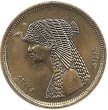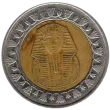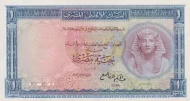Exchange your Egyptian Pounds
Do you have leftover Egyptian Pounds? We offer a fast and easy way to exchange both current and withdrawn Egyptian Pound banknotes and coins. Convert them into your local currency today with our quick and hassle-free exchange service.
£ or ج.م - EGP
The Egyptian Pound has been in use since 1834, and it remains a stable and trusted currency in Egypt’s evolving economy.
Egyptian Pounds Information
The Egyptian Pound (EGP) is the official currency of Egypt, a country with a rich history and a key economic player in North Africa and the Middle East. The Egyptian Pound was introduced in 1834, replacing the Egyptian piastre as the official currency. Over the years, the pound has undergone several changes but remains a symbol of Egypt’s economic identity.
The Egyptian Pound is subdivided into 100 piastres, and the currency is issued in both coins and banknotes. Coins are available in denominations of 25, 50 piastres, and 1 pound, while banknotes are issued in denominations of 1, 5, 10, 20, 50, 100, and 200 pounds. The designs of Egyptian Pound banknotes often feature images of famous ancient Egyptian landmarks such as the Sphinx and the Pyramids of Giza, as well as important figures from Egyptian history.
Egypt’s economy is one of the largest in Africa, and the Egyptian Pound plays a crucial role in facilitating both domestic transactions and international trade. The country’s main industries include agriculture, manufacturing, and tourism, with Egypt being a major exporter of goods such as cotton, textiles, petroleum products, and chemicals. Tourism, in particular, is a vital part of the economy, as millions of visitors come to Egypt each year to see its historical landmarks and the stability of the pound.
The Central Bank of Egypt (CBE) is responsible for issuing the Egyptian Pound and managing the country’s monetary policy. The CBE plays a crucial role in maintaining price stability and ensuring low inflation, which helps preserve the value of the pound. In recent years, Egypt has implemented a range of economic reforms aimed at stabilising its currency and fostering economic growth, supported by the International Monetary Fund (IMF) and other international partners.
One of the key challenges facing the Egyptian Pound has been its vulnerability to global economic fluctuations and political instability. Over the past decade, Egypt has experienced periods of significant economic turbulence, particularly in the aftermath of the 2011 revolution and the subsequent years of political uncertainty. These events led to a sharp depreciation of the Egyptian Pound and increased inflation, impacting the everyday lives of Egyptians.
In 2016, Egypt undertook a major devaluation of the pound as part of its agreement with the IMF to implement economic reforms. This devaluation, while initially painful for the economy, helped to stabilize the currency and attracted foreign investment. Since then, the Egyptian economy has shown signs of recovery, with the pound gradually regaining some of its value.
The Egyptian Pound continues to be an essential part of the country’s economy, supporting both local commerce and international trade. Despite the challenges it has faced, the currency remains a symbol of Egypt’s resilience and its ongoing efforts to achieve economic stability and growth.
In conclusion, the Egyptian Pound has been the official currency of Egypt since 1834. It remains a central part of the country’s financial system, reflecting Egypt’s rich history and its modern economic ambitions.

















